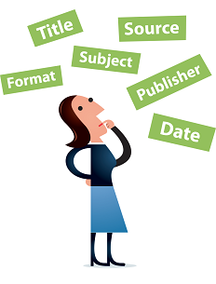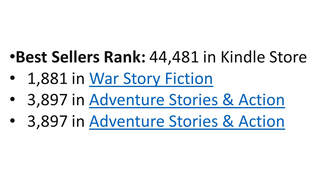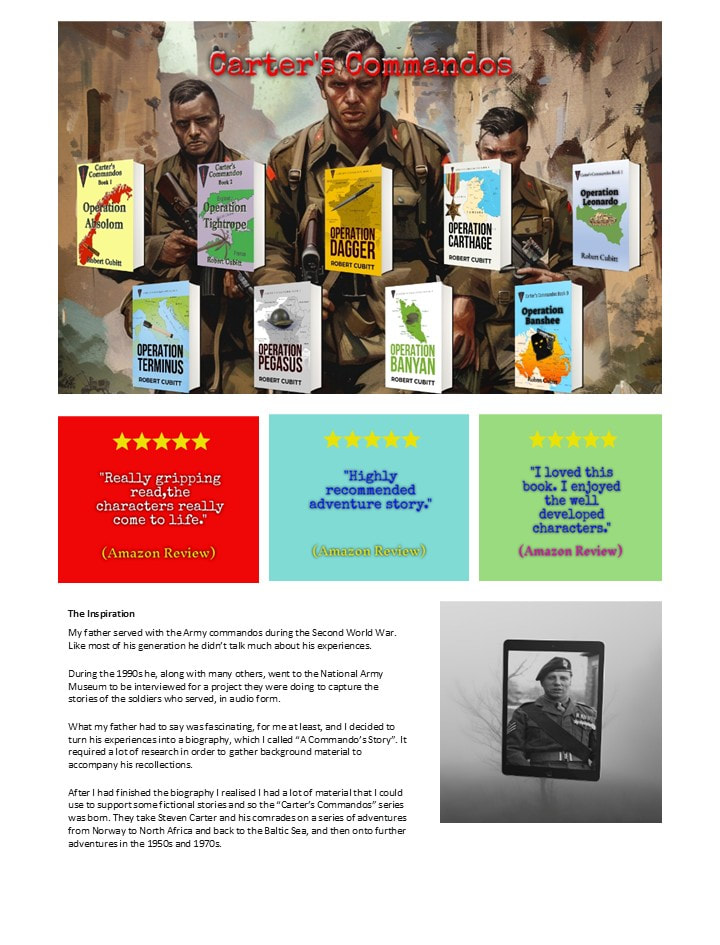 I’d like to start this week’s blog by asking you to use your imagination for a moment. Imagine you are at a book fair and a potential customer stops in front of your table. They pick up your book, examine the front cover and then turn it over to read the back matter. Then they raise their eyes and are clearly going to speak to you. “Did you write this?” they ask (they always ask that for some reason, that or “are you the author”?). “Yes.” you reply. “Is there anything you want to know about it?” There then follows a conversation about the book, which can take too many forms for me to cover all possibilities. But one question that is often asked is “What inspired you to write this book?” This is the solid gold question. If you can answer that, you have an almost certain sale. Readers love to know the “origins” story of a book. Not the origin in the way “Batman Begins” is an origins story. This is the origin of the idea, the inspiration that caused the book to be written.  But on Amazon (and other retail sites) you are unable to tell that origins story that increases the likelihood of making the sale. Except that you can tell the story. This blog is about how you can tell it. You might think that you could include it in your blurb. But that is not effective. Readers rarely read all the way to the end of a blurb. After 200 – 300 words they are either interested enough in the book that they stop reading or are so disinterested they are already scrolling through the search results looking for something else. Those latter readers are lost to you, so we can dismiss them for the purposes of this blog (though why they are disinterested is the subject of lots of blogs about blurb writing). The trick now is to turn interested readers into buyers. They are the person stood in front of your table at the book fair asking about how your book came to be written. But they are viewing the book on Amazon, so how can you answer that question?  Finally, we get to the point of this blog, which is that you use A+ Content. This is exclusive to Amazon and Amazon claims that using A+ Content increases conversions to sales by up to 10%. In terms of ad clicks, that’s one extra sale for every 10 clicks. Those extra sales alone could pay for the ad. We have blogged about using A+ Content in the past, so this is something of an update based on what we have learnt since then. First of all, what is A+ Content?  It is space on your Amazon sales page that you can use to provide additional information about your books. There are several ways of using it and different types of sellers will use it in different ways. You have probably seen A+ Content when you have shopped on Amazon and not even been aware of it. You can insert graphics, graphics and text, product comparisons and all sorts of other stuff. But the key thing for this blog is that you can provide that “origins” story. The wordcount is limited, so you have to be brief, but a good writer can pack a lot into very few words. A+ Content is inserted as “modules”. Each module is a combination of graphics, text and other elements that allow you to provide the additional information. In addition, you can add keywords to the graphics, so the measly 7 sets of keywords that KDP allows you for your books is now capable of being multiplied. You can use up to 5 modules. The type of content we are about to describe uses 3 modules, but don’t let that limit you. If you can think of ways to use 5 modules, then use 5 modules. Below is the total display we used for one of our books. We’ll talk you through each module below it. The top module is the attention grabber. It is the sort of thing we use in our ads, so some of our potential readers may already have seen it. As you can see, it makes it clear that the book we are trying to sell is part of a much longer series, which appeals to a lot of readers. Below the main graphic we have used a module that inserts 3 images side-by-side. Each image features a quote from reviews of the book. We created these as images so we could make them stand out more than just using plain text. Reviews are known to be a critical part of the “sales funnel” because good reviews stimulate a desire in the reader to read the book. Our 3rd and final module is the one we think is doing the heavy lifting. It is where we tell the “origins” story. It is an image on one side (it can be either left or right) along with accompanying text which we have headlined “The Inspiration”. You don't have to use an image, of course, but we think that adds greater interest as images draw the eye to the text. It is this final module that will turn interested readers into buyers. Yes, they may still scroll down the page to see more reviews. Yes, they may still go to the “free sample” to read the opening chapter(s). But mentally they have already bought the book if they like the “origins” story that goes with it. Just an FYI, when the Amazon page is viewed on a phone, the A+ Content is usually the first content to be seen, so you can get a strong message across even before the reader gets to the blurb.  How do you upload A+ Content onto your page? Go to your KDP bookshelf and select “promote and advertise” from the drop-down menu to the right of the book (3 dots). On the marketing tools page, look for “A+ Content”. Select the marketplace for your book (you can use different content for different Amazon territories) and then go through the various steps to select and insert the modules you want to use. I suggest you read the KDP tutorials on A+ Content before you start if you want to avoid wasting time, because the process isn’t as intuitive as KDP’s designers would like to think. You can find more information here. A+ Content If you want to use A+ Content on both an ebook and paperback page, you have to create it twice, once for each ASIN. If you have enjoyed this blog or found it informative, make sure you don’t miss future instalments by signing up to our newsletter. We’ll even send you a free ebook if you do.
0 Comments
 In our blog a couple of weeks ago I posted a table (the one to the left) that showed the way read through rates for books in a series declined the longer the series ran. I said at the time that there were reasons for that decline – some author driven and some reader driven – and that the explanations were really the subject for a whole different blog. This is that blog. This table shows the “benchmark” average read through rates for a series. The average is probably skewed by series with very high read through rates, such as the Harry Potter books, Jack Reacher books and others. I suggested that read through rates of 70% from book 1 to book 2 for the average Indie author probably weren’t to be expected. But I also suggested that a read through rate of less than 50% was a matter for concern.  Let’s start with the reader driven reasons why the read through rate for a series isn’t 100% every time. Firstly, not every series is going to appeal to every reader. They may enjoy book 1, but they may decide that 1 book is enough and they want to find something different to read. That’s fair enough. I have enjoyed many a book but not gone on to read anything else by the same author, because I fancied something different. The next reason is “reader fatigue”. This is readers who have read book 1 and maybe also book 2, but are starting to get a little bit bored with the series. Like the first cause above, the reader is hankering after something a little bit different and book 3 of your epic saga is not going to provide that - or so they believe. I have experienced that with the Jack Reacher books. Having read several, I have taken a break, and I haven’t yet gone back to them.  The final reason is distraction. The reader has every intention of reading the next book in the series, but they just happen to see a “shiny object” on Amazon, or maybe someone recommends a book to them, and they decide to read that instead. They feel sure they will return to your series later, but they never seem to get around to it because there are always more shiny objects and book recommendations. eBooks make distraction so much easier to interfere with sales, because a hard copy book sitting on a table or bookshelf is hard to ignore, but one hidden away on a Kindle is far less intrusive. I am as guilty of this as anyone. I have actually returned to a series downloaded through KindleUnlimited only to be told that the reading date has expired and I’m going to have to download it again. So, I go onto Amazon to do that, only to be distracted by another shiny object. There is nothing much you can do about any of these reader behaviours. The best you can hope to do is make your series so compelling that boredom and distraction can’t find a way in.  Now we come to author-based reasons for poor read through rates. These the author can fix, but they have to realise that they have a problem so that they know they have something to fix. First of all, there is optimising the series to improve read through rates. It has to be set up on Amazon (and elsewhere) as a series. If it isn’t then read through rates will suffer because people think they are buying a standalone book. It also has to have a series blurb that is every bit as compelling as the blurbs for the individual books. The easiest book you will ever sell is to someone who has just enjoyed one of your books and wants to read another. This means setting up your “back matter” at the end of the book to make it easy for the reader. Include the opening chapter of the next book (perhaps more than one chapter if they are short). I would suggest at least 5k words. It is normal for readers to read those and once they have started, they find it difficult to stop – so you don’t really have to do anything else except make it easy for them to find the rest of the book.  Which means putting a link of the extract in the ebook so that they can click straight through to the sales page and hit that “buy now” button. Make it a universal link so it goes to the right page for the territory in which the reader lives, because the more times they have to click the less likely it is that they will buy. Make sure the link goes to the series page – not to the individual page for book 2 (or whatever book it is). There are very sound reasons for linking to the series page. First of all, there are no adverts on that page – so no shiny objects to tempt the reader away. Secondly, there is a great big button that allows the reader to buy the whole series at once – which some readers do. Even if they don’t buy the whole series, they may buy more than one book. It is a smart button, so it knows which books in the series the reader has already bought and doesn’t include those in the price. It even knows when you are running a Kindle Countdown Deal so it will adjust the price for the series. One important thing to know about series pages is that every time you add a book to the series, Amazon changes the ASIN. That means that you have to create new universal links for it and change them in all your marketing and your backmatter. If you don’t the reader will see a “page not found” message and you will lose the sale.  Next up is category selection. Some readers only read a single genre of book. They have seen yours, thought it was in the genre they like and bought the book. They may even enjoy it up to a point. But they won’t buy the next in the series because it isn’t in their favoured genre. Book covers are the usual cause of the reader being misled, but if it shows up in a category search under the wrong category, that will also cause the problem. So, choose your category or categories with care and make sure the cover is appropriate for those categories. You may think that is a pretty obvious point to make, but some authors mistakenly think that listing their book in the most popular categories will be good for sales. It isn’t, because the readers who buy by category alone don’t like being misled. It can also screw up your advertising strategy big time but that, again, is the subject for a different blog  But the main reason for poor read through rates is a bit more difficult for authors to accept. It may be that readers just don’t like the first book, so they aren’t interested in buying the second. There can be many reasons for that dislike: poor quality writing, uninteresting characters, poorly structured plot, too many typos and a whole lot more. You have to identify those issues and fix them, or you will never get good read through rates for the series. It is the major reason for the benchmark read through rate from book 1 to book 2 being only 70% in the first place. For the Indie author that rate (as explained above) is going to be lower anyway, but you can improve it if you can fix the worst issues. So, to summarise. There is nothing much you can do to change reader behaviour when it comes to improving read through rates, but there is plenty you can do to fix author behaviour. You can either accept your poor read through rates – or you can take action. It’s over to you. If you have enjoyed this blog, or found it informative, then make sure you don’t miss future editions. Just click on the button below to sign up for our newsletter. We’ll even send you a free ebook for doing so.  We blogged about Publisher Rocket a couple of years ago, but Dave Chesson, the man behind the product, has just released a brand new version and it is even more powerful for Indie authors than ever before. For that reason, we are bringing you this update. Unfortunately, along with its new features has also gone a price hike. It now costs $199 (special offer price, correct at time of writing) for a lifetime subscription (that’s about £155 for us Brits). Naturally, you have to sell more books to repay that investment. What must be borne in mind, however, is that the tools Publisher Rocket provides actually help you to sell your books, whether you advertise or not.  The key thing about publisher rocket is its ability to provide you with genre, competitor and keyword information that makes sure that your book not only appears in searches on Amazon, but it appears higher up the results list, so that it is more likely to be seen. It also makes advertising on Amazon a whole lot easier by providing you with keywords appropriate for your book, so your ads are seen by the right people – people who read books like the ones you write. It is able to do this because it makes use of Amazon’s search history data. That data is gold dust when it comes to both publishing and advertising books and we, as Indie authors and publishers, have no way to access it by ourselves.  Amazon has become very concerned about what is known as “customer experience”. Basically, how easy shoppers find it to use Amazon. Part of that experience is the customer’s reactions to seeing irrelevant products in search results. Seeing a dark fantasy novel appearing in a search for high fantasy is probably not something that most shoppers would worry about. But seeing a Regency romance novel appear in a search for high fantasy is likely to irritate customers. If it happens a lot, it will irritate them a lot. And that is why Amazon have introduced a major change into their advertising process. The relevance of keywords has never been more important. Having irrelevant keywords in your ads can cost you more money and they may result in you selling fewer books. This is the exact opposite of what many Amazon Ad gurus used to advise, which was basically to load up your ad with as many keywords as possible, even if they were only remotely connected to the genre of your book.  I’ll run through this briefly, but it is important. When you set up a “sponsored product” ad with Amazon, using your own list of keywords, Amazon now scans your book’s meta data* and gives the keywords a “relevancy score”. The better that score, the higher up the pecking order your ads will be placed when it comes to the bidding process that decides which ads are shown to the customer in response to a search.. When the bidding process is carried out, the higher the relevancy score, the more likely it is that your ad will be the one chosen. If Ad A and Ad B both have a maximum bid of 50c set, then the ad with the higher relevancy score will be the one that is shown to the customer. This helps Amazon to prevent irrelevant ads being shown to the customer, which annoys them. What this could mean is that ads with lower relevancy scores have to spend more money to win the bidding process. Depending on their maximum bid setting they may never be seen at all. And an ad that isn’t seen can’t sell your book.  As publishers we use Publisher Rocket a lot to help us find the right category listings for the books we publish, to find the right 7 keywords to put into the book’s meta data and to find the right keywords to use in our Amazon Ads. To indicate how useful this tool is, we’ll tell you what happened the first time we used one of the new features. Like a lot of authors, we have always struggled to find the right 7 keywords to put into the meta data for the books we sell. This is why we have found Publisher Rocket so useful, because it helps to take the hard work out of finding keywords. One of the new features allows us to do a “reverse search” to find books like our own, and then find the keywords that are helping those books to sell, so that we can use them too.  So, we pasted the ASIN for our book into the box in Publisher Rocket, then pasted in the 7 keywords that we had used in the meta data for the book when it was last uploaded. The app then provided us with a list of books that Publisher Rocket, using Amazon’s search data, thinks are similar to ours. We were very, very surprised to find that all the books that were provided for comparison were non-fiction. The reason that we were so surprised is because our book is fiction. Now, things aren’t as bad as they might seem, because the book has actually been selling as a result of the searches that it showed up in. But it could obviously have been doing better if it had shown up in searches for fiction rather than non-fiction. The next bit of the process was a bit more time consuming, but necessary.  To find comparable fiction books we had to go onto Amazon (using incognito browsing) and do searches of our own to find our direct competitors. Once we had found the right sort of book, we pasted its ASIN into Publisher Rocket so that it could do its magic. We needed to provide 3 ASINs from books by different authors, to give Publisher Rocket enough data to work with. We then got back a lengthy list of search terms that had been used to find the three books we had identified. After that it was just a case of picking the seven most relevant terms for our book and entering them into the meta data and re-publishing it. So, if those same search terms are now used again by readers, our book will show up alongside those competitor books. But we didn’t stop there.  We run Amazon Ads for the same book and none of those keywords were included in the list of keywords for the ads. But now we were no longer limited to just seven selections, we could use more, which we did. So, in the space of about 20 minutes we were able to make both our meta data and our Amazon Ads more relevant and therefore more likely to be seen by the right readers - the readers that will actually buy the book. The most noticeable thing to be seen was that almost immediately we started to get more clicks on our ads. Quite clearly our book was now more relevant to the searches readers were doing. But more importantly, because the book was more relevant to the readers, more clicks were being converted to sales. Obviously, we can’t guarantee that you will experience similar results, but when marketing a book every little thing you do makes a difference and the most important thing to do when you launch a new book is to make sure that it is in the right categories and has the right meta data. If nothing else, Publisher Rocket will put you on the right path to success.  While we’re at it, we’ve discovered a way of getting 14 keywords into your meta data and it’s so simple we feel a bit stupid for not spotting it before. Most people set up their ebook before their paperback because it is less complicated and because an ebook can go on pre-order. The meta data for the ebook is then copied across to the paperback version’s meta data automatically when it is set up. Which means the same 7 keywords are copied across. But those keywords can be changed! Which means that you can use Publisher Rocket’s capabilities to use 7 different keywords for the paperback. Double the number of relevant keywords means double the chances of your books showing up in appropriate search results. The key messages for this blog are therefore: 1. The relevancy of the keywords in your meta data has never before been so important, 2. If you use Amazon ads, your ads may be more expensive and might not even be seen if your keywords aren’t relevant. 3. Finding more relevant keywords for your books is now much easier using the latest version of Publisher Rocket. To find out more about Publisher Rocket, click here On the website you can also gain access to a free course on using Amazon Advertising more effectively. You don’t have to buy Publisher Rocket, but you do have to subscribe (free) to the website.  And here’s a one time special offer for you as readers of this blog. If you don’t have Publisher Rocket, but would like to check the relevancy of you book’s keywords, we’ll run a free check for you. Just sign up for our newsletter (button below), then email us at [email protected] to claim your free relevancy check. You’ll get an email back from us asking you to provide some basic information about your book, so please check your spam folder to make sure you don’t miss it. You’ll also get the free ebook that we always give to new subscribers. * For those of you not sure what we mean by meta data, it is all the information you provide on the first page of KDP when you start to upload your book: Title, subtitle, blurb, categories and, of course, 7 keywords/phrases. FYI, a “keyword” can be up to 50 characters long.  Bryan Cohen of "Selling For Authors". Bryan Cohen of "Selling For Authors". I watched a very interesting webinar recently, about using keywords to improve sales on Amazon (and other retailing websites). I can’t provide a link to it, because it expired on 2nd July, but it was created by Bryan Cohen, owner of the Selling For Authors website. Bryan provides training for authors who need help marketing their books and he has also published a number of books on the subject, some of which have been reviewed on this blog page. We’re big fans of Bryan because he has helped us to increase our sales. So, with the webinar no longer being available, we thought we would tell you about some of the things we learnt from it.  Basically, the webinar was about “Search Engine Optimisation”, aka SEO. But rather than being about using SEO techniques to help people find your website (you may not even have one), it is about helping readers to find your books on whichever websites you sell them. Although I will be talking almost exclusively about KDP and Amazon, the same techniques can be used for whichever websites you use to publish and sell your books. The secret is keywords. Those are the seven words you are able to input into the metadata for your book when you upload it onto KDP.  Metadata, if you are unfamiliar with the term, is the stuff you enter in the first part of the KDP process: Book title, author name, blurb, etc. That is all copied across to other versions of the book, such as paperbacks and some of it also appears on the Amazon sales page. But from the point of view of this blog, I’ll be talking about keywords and subtitles which are a very important part of the metadata.. Now, I’ve already said KDP allows you to enter 7 key words for your book. That is misleading, because you can actually enter whole phrases. If you enter 7 phrases of five words each, that’s 35 words you actually use. The critical thing is, the closer you can match those phrases to the ones people use when they search for books on-line, the higher your book will appear in the search results.  If you use a generic term in your keywords, such as Sci-fi, then it generates thousands of results, and your book will be hidden away in amongst all the others. But if you get an exact match on a longer phrase, the only books that will appear higher in the results are those which have been “sponsored” (paid for adverts) and other books with keywords that are an exact match for the same search term. A book that hasn’t sold a copy since Adam was a lad can appear on the first page of the search results if the right keywords have been used. And experience shows that a book that appears on the first page of search results has a far higher chance of being purchased than one that appears on the subsequent pages. Bryan advises us that there is a process for finding the right keyword phrases to use. Trying to short-cut that process is likely to give disappointing results, so you are advised to set some time aside for this activity. 2 to 3 hours should be enough for a single book.  If you can’t spare 3 hours out of your busy schedule to sell your books, then you will never sell any books. The first thing to do is to think what your book is actually about in the simplest terms. This is not about writing a synopsis or even a back cover blurb. This is about finding a few words that describe it in the most basic form. So, let’s say your book's genre is sci-fi.
Having decided what sort of book you have written, you now need to brainstorm some phrases that might be put into a search bar by someone who is looking for books like yours, eg Sci-fi set in space but including time travel. Why do you need more than one phrase? Because this isn’t an exact science. We don’t yet know which words are going to provide the best results, so we are indulging in trial and error. This is why you need to set time aside to do this.  The next step is to try the phrases out in Amazon’s search bar to see what sort of results they generate. Use “incognito browsing” for this, so Amazon doesn’t show you your own books, because you are looking to see what results are produced for successful books (I’ll define successful a bit better in a moment). Having entered your first phrase, take a look at the results. Ignore the ones that have been sponsored and also ignore any books that are being offered for free, because you don’t know if they are popular because readers like them or because the readers just want a free book. Click on the book that is highest in the results (after excluding sponsored and free) and read the blurb. Is it like yours in basic terms? If no, then the phrase you have used isn’t producing the correct results and you can discard it. If yes, you can now scroll down to the book’s details and look at the sales rankings. This is where you consider if the book is successful or not.  If the book’s overall sales ranking is better than 50,000 it is probably selling reasonably well. But also look at its rankings within its categories. If they are looking pretty good (better than 5,000), then that confirms your initial feelings. But are they the same categories that you have selected for your book? Because that is an important factor too. If they aren’t you can change your categories in KDP later, because if their book is selling well in those categories, yours have a good chance too if they are similar. Don’t bother with books that have a sales ranking worse than 500,000. They aren’t selling enough copies, which means that the keywords you used aren’t going to sell you many books because the results aren’t producing what the readers are looking for. Also don’t try to compete with the books that are at the top of the rankings. They are probably being written by well-known authors, which means you stand little chance of your book being selected as the one to buy. You are looking for the “mid-range” results that will sell you around 10 copies a day. If you get momentum from that you will climb the sales rankings naturally and you may end up competing with the bestselling authors that way, which is a happy place to be.  Repeat this process until you have 2 or 3 phrases that are producing the sorts of search results you were hoping for. Now go to KDP and enter those phrases into the keyword boxes, replacing any keywords that you feel probably aren’t working for you. If you use “Publisher Rocket” (we do) these will be easier to identify. Finally, the hardest part of all – be patient. If you have chosen the right keywords, sales will come, and they will be better than the sales you have had before. If you don’t have the success you expected after about a month, then repeat the process, generating new phrases to try. Don’t try to change all 7 keywords in one go. You won’t know which ones are working and which aren’t, and you may delete keywords that were selling you a few books before you tried this. If your sales are worse than they were before you started then not only are your new phrases not working for you, but you may have deleted useful keywords and you need to reinstate them.  Now, before we go on to talk about subtitles, just a word about the section of the metadata that asks you if the book contains “adult” content. Amazon isn’t too clear on what adult content is and what it isn’t. Accordingly, Bryan Cohen advises that you click on “no” for that question. If you write books that are erotic, contain a lot of extreme violence or lots of strong swear words, then maybe you should click the “yes” option. But otherwise, your books may end up in the adults only dungeon (Bryan’s words) and not be seen by a lot of potential readers. Ask yourself this: “Would I be happy with my 14 year old child reading this book?” If the answer is yes, then no harm will come from clicking the “no” button as children below that age tend not to buy books, their parents do the buying so let them make the decision. Now, subtitles.  We hadn’t thought about these too much in the past and hardly ever use them, but it turns out we should have. Using a subtitle allows you to have an 8th keyword phrase in your metadata that Amazon can find when people do searches. Naturally, as the subtitle appears on the book’s sales page it needs to be grammatically correct, but it can be used to provide guidance to the reader about the book’s content, which may not be apparent from the title. For example, one of our sci-fi titles is called “The Magi”. For some readers that could be interpreted (despite the cover showing an image of a spaceship) as being a book about the Three Wise Men who visited Jesus in Bethlehem. But by adding a subtitle that says “A sci-fi action adventure” we are describing the book in a way that can’t be misinterpreted. Subtitles like that can be used for any book written in any genre. Again, using trial and error, generate some potential subtitles and put them into Amazon’s search bar and see what results they produce. If they give you a list of books that use the same or similar subtitle, which the blurb tells you are the same sort of books that you write and which have reasonable sales rankings, then you are onto a winner. If your books have been organised into a series on KDP, as they should be if they are a series, then don’t use the series title in your subtitle. That will appear in search results if a reader uses the series title as a search term. The series title appears on the sales page anyway so you will be duplicating the wording and that looks amateurish. You don’t have to include your subtitle on your book cover. If you use KDP’s cover creator, it will pull the subtitle through from the metadata if there has been no previous cover created, but you can delete it from the cover if you want to. If you designed your own cover, you don’t have to change it to include the subtitle. Just a note about paperbacks (and hardbacks). Once these have been published you can’t go back later and add a subtitle. However, if a search throws up your ebook, then the other buying options will also be shown on the sales page so readers will see that there is a hard copy option if they want it.  I have tried to cram into less than 10 minutes of reading what Bryan took an hour to say in his webinar, but of course he went into a lot more detail. So, if you want to know more, I suggest you contact Bryan through his website. As well as selling training he also runs regular “author challenges” where he provides coaching for free, so you may care to sign up for one of those in order to expand on what we have discussed here. If you have enjoyed this blog, or found it informative, then make sure you don’t miss future editions. Just click on the button below to sign up for our newsletter. We’ll even send you a free ebook for doing so. |
AuthorThis blog is compiled and curated by the Selfishgenie publishing team. Archives
June 2025
|

 RSS Feed
RSS Feed